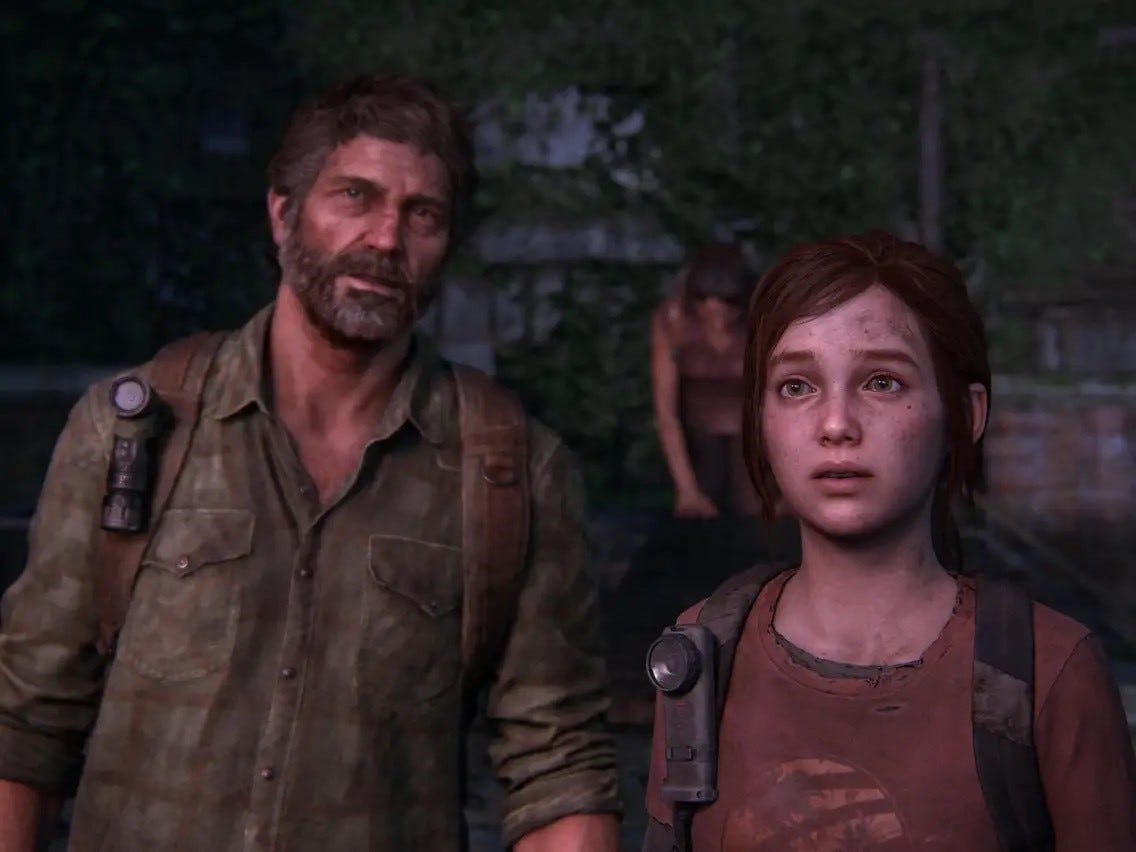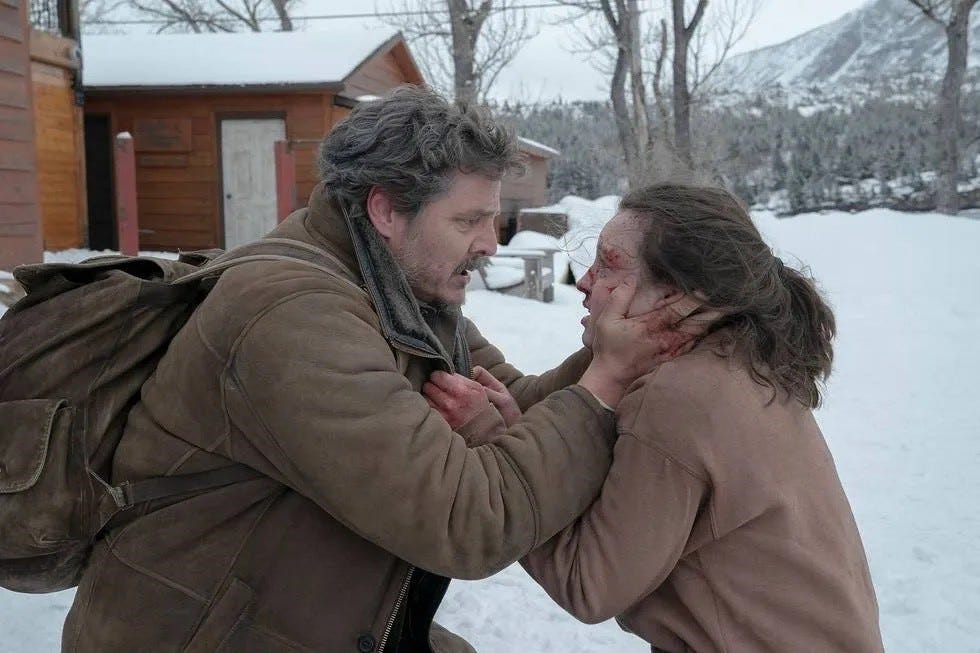#121: The Last of Us: A Video Game to TV Show Comparison
Featuring special guest Justin the Gamer. (Source Material, Vol. 16)
Hello friends!
Life has been a bit busy lately with my 20-year high school reunion earlier this month, preparing for our home to be renovated, and preparing for a family reunion to celebrate my in-laws 50th anniversary. It’s a lot!
But today I have a special guest to help me talk about a popular video game that I’ve been playing but haven’t finished1. This game was adapted into an HBO television series that I liked, but didn’t love.
Let’s talk about The Last of Us.
I asked my friend Justin (a.k.a. Justin the Gamer) to share his thoughts because he played through the entire game and watched the show and I wanted to hear his hot takes.
There will be spoilers.
Let’s get into it!
I carefully peer around the corner. There are 3 infected inside the store. One runner crouched down with his back to me, muttering nonsense. Two clickers, blindly wandering up and down the aisles. They haven’t noticed me yet. I check my inventory. I only have two bullets and a bat. No shivs. If I go for the runner with my bat, the two clickers will be on top of me before I can finish them. I better take care of the clickers first. Once I shoot the first clicker, the second one will be after me. The runner won’t be far behind. I need to shoot the second clicker, in the head, and then pull out my bat to fend off the runner before it gets to me. If I miss with either of my two shots, then Ellie’s not going to make it to the Firefly base.
I love video games, but I don’t always play them for the story. Some of my favorite games don’t really have stories (Tetris, FIFA), some have stories that I don’t care about (Super Mario Odyssey, Metroid Dread) and only a select few have stories that I feel emotionally invested in (God of War: Ragnarok, Marvel’s Spider-Man, Final Fantasy VII Remake). But I don’t think I’ve ever experienced a video game story as gripping as The Last of Us.
In the game, the plot is conveyed through a combination of cut scenes and in-game dialogue and events. All of the dialogue is well-written and well-acted. It is on par with some of the best movies and TV shows I’ve seen. But plot is only part of what makes a good story. The emotional weight, the tension, the sense of dread, an appreciation for what is at stake — those all come from the gameplay itself. Desperate situations that require you to act. The sense of relief you feel when you overcome those situations. It is unlike anything you feel when you passively watch a movie or a TV show. When it’s time to watch a cut scene, not only is it rewarding to see how the story progresses, it’s rewarding to set your controller down and get a break from the tension.
The story in The Last of Us is told so well through the medium of video games that it begs the question as to whether it really needed to be adapted to TV. On the one hand, it was ripe for adaptation because it didn’t need much adapting. You could reshoot all of the cut scenes with live actors, add a few filler scenes to connect them, and put it out as a TV show, and it wouldn’t be that bad (for some episodes of HBO’s adaptation of The Last of Us, this is basically what happened). On the other hand, what could a TV show add to the story that the video game didn’t already accomplish?
Film > Game
Let’s take a look at some of the advantages that film has over video games.
Real actors and sets — while motion capture and animation are continually improving, a video game doesn’t give you the emotional nuance of actual people interacting in actual sets. If done right, film can feel more real than video games.
Accessibility — Not everyone wants to play video games. Not everyone has the right console or gaming PC, and not everyone is interested in them. But pretty much everyone likes to watch TV.
Social viewing — even though watching film is a passive experience, it’s one that you can experience with other people. Yes, you could watch someone play a story-driven video game and then discuss it, but I’ve never been a fan of watching people play video games. If a game is designed to be a single player experience, I’m going to experience it on my own.
More room for exploring other characters — Jumping around to different characters would feel a bit disjointed in a game. A game typically has to stay with the main characters for it to work right. As a player, you have to see the world through the eyes of the characters you’re controlling. For that reason a game is often limited in how much exposition it can have for other characters.
Game > Film
While there is some overlap in how stories are told in film vs. video games, the latter is a fundamentally different experience.
Immersion — the story in video games is more immersive because you are embodying a character. In The Last of Us, you are Joel. You decide what he does, where he goes, what he shoots at, who he chokes out, etc. When things happen to Joel, it has a different emotional impact than when something happens to a character that you are passively watching in a TV show.
Tension — The tension in video games can be more intense because you actually have to do stuff. When you get to a scary part in a movie or TV show, you can close your eyes, zone out, remind yourself this isn’t reality, mentally disengage, whatever. Regardless of what you do, the moment will pass and you can move on with the story. Video games don’t work like that. You are an active participant. Not only do you have to deal with the tension of seeing scary things happen on screen, you have to take action with the knowledge that messing up will get you killed.
Action — In film, action scenes can be tedious if overdone. The enjoyment of watching film comes more from connecting with the characters than from passively watching action scenes. There is a limit to how long an action scene can be interesting without taking a break for character development. Video games on the other hand can get away with longer action scenes because the player is an active participant in them and is less likely to disengage due to a lack of emotional connection.
A successful video game adaptation would theoretically embrace the advantages of film while downplaying the aspects of video games that don’t translate as well. So how did HBO’s The Last of Us do?
Production values were fantastic. I couldn’t have hoped for better acting or writing. I will note that some of the dialogue is exactly the same as the game, word for word. In some ways this was a relief — why mess with something that works? But on the other hand, when you hear a version of dialogue (or a song) that’s mostly faithful to its source material but just a little different, it can be off putting (like every live adaptation of a Disney animated movie).
After episode 3, which takes a break from the Joel/Ellie story to explore the relationship of Frank and Bill, I thought the show would take a slower walk through this fungus-invested apocalypse and explore characters more deeply than what the game allowed. But the plot never really slowed down after that. It seemed to race to the finish. You get a little more exposition about Sam and Henry, you meet KC boss Kathleen and you get to know that cannibal leader at the lakeside resort a little more, but the show doesn’t really offer any other important story beats that the game doesn’t cover. I would have preferred a slower, more explorative take. If the season ended with Joel and Ellie reuniting with Tommy, I would have been fine with that.
There were surprisingly few infected. I will rarely complain about a show cutting out action seasons to make way for human interaction and character development, but I found myself wanting more action from this series. There are some amazingly tense parts of the game that could have made for some memorable edge-of-your-seat TV moments. This is another reason I wish the creators would have taken their time progressing the plot. But I could be wrong — maybe the showrunners kept action to a minimum so that when it does come, it’s that much more impactful. I won’t fault the creators for making a deliberate artistic choice, but the fanboy in me wanted more clickers, stalkers and bloaters. That said, if for some reason the showrunners were compelled to complete the story in one season, then I’m happy they emphasized character relationships over action scenes. As I said before, video games are often better for action scenes anyway.
I loved the show. Did it give me anything the video game didn’t give me? A little. If you want to experience the full impact of the story, I recommend playing the game. But it’s still enjoyable watching a high-quality adaptation of a story you love. And as far as video game adaptations go, this is probably the best one ever made.
I (Kyle) started the game about a week before the show premiered and thought I could keep up. I fell behind after 3 weeks. How naive I was!







